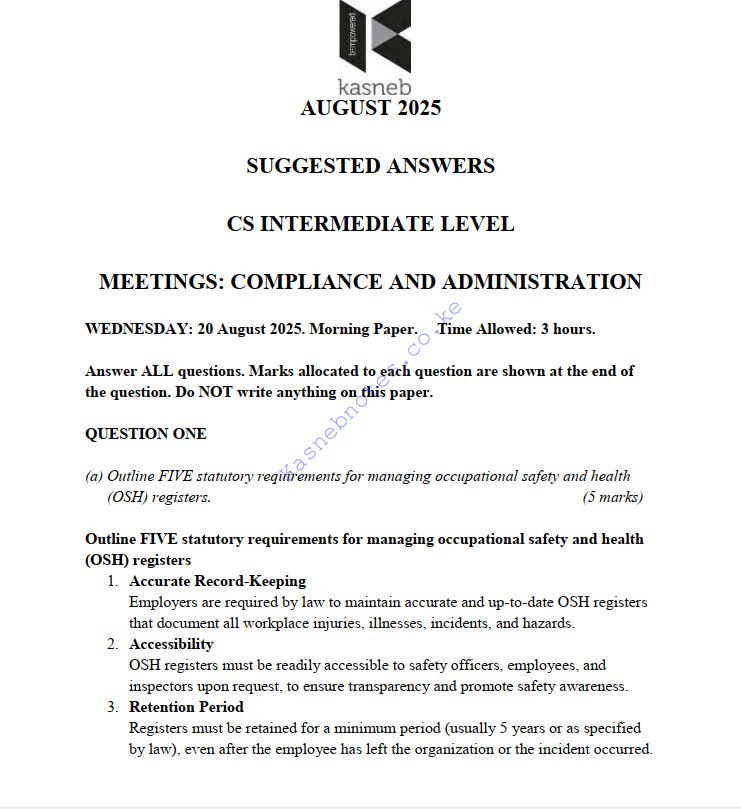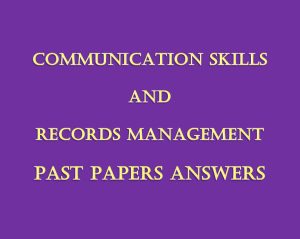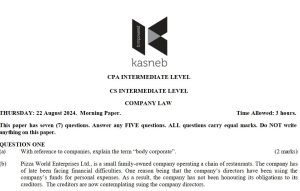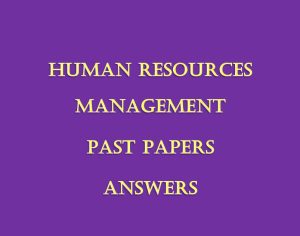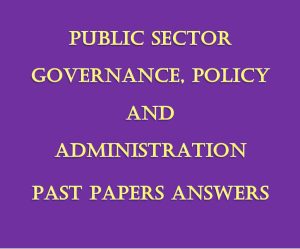Original price was: KSh500.KSh299Current price is: KSh299.
Download April 2025 Meetings, Compliance and Administration Past Paper answers in Pdf form
Description
QUESTION ONE
(a) Outline FIVE statutory requirements for managing occupational safety and health (OSH) registers. (5 marks)
(b) Before a general meeting, shareholders can propose resolutions or statements for circulation. However, the law permits companies to reject these requests under specific conditions.
With reference to the above statement, explain FIVE circumstances under which a company may do so.
(10 marks)
(c) Evaluate FIVE legal and procedural requirements for the valid execution of a document under a common seal.
(5 marks)
(Total: 20 marks)
QUESTION TWO
(a) Under the concept of shares with differential rights, explain FOUR rights that can be attached to shares. (4 marks)
(b) With advances in information technology, many legislative bodies now hold virtual meetings. However, there are important legal factors to consider in ensuring these meetings are valid, secure and effective.
In relation to the above statement, identify FIVE legal considerations for convening virtual meetings by the National Assembly. (5 marks)
(c) Company listing on a securities exchange is a complex process that requires expertise from various advisers to ensure compliance, effective share distribution and clear communication to stakeholders.
With reference to the above statement, summarise FIVE essential roles played by advisers during such a process.
(5 marks)
(d) Explain THREE governance principles outlined in the governance standards and guidelines regarding the conduct of general meetings. (6 marks)
(Total: 20 marks)
QUESTION THREE
(a) Professional bodies such as the Institute of Certified Secretaries (ICS) offer Continuous Professional Development (CPD) to its members as part of professional growth and development. Adopting best practices in implementing CPD helps ensure that learning activities lead to meaningful professional growth and enhanced job performance.
Required:
Explain FOUR best practices that Company Secretaries could employ to ensure effective CPD. (4 marks)
(b) A shareholders’ agreement is essential for outlining the rights and responsibilities of shareholders, helping to prevent conflicts and guide company governance.
With reference to the above statement, identify FIVE objectives of a shareholders’ agreement. (5 marks)
(c) Examine FIVE ways a liquidator can maintain impartiality and avoid conflicts of interest. (5 marks)
(d) Describe SIX benefits of Subsequent Board Meetings. (6 marks)
(Total: 20 marks)
QUESTION FOUR
(a) Describe FIVE stages of the evolution of the corporate secretarial profession in Kenya. (5 marks)
(b) Board papers must be carefully prepared to ensure that they meet governance standards and effectively support the board’s decision-making process.
Required:
Explain FIVE critical steps involved in the preparation of board papers in line with governance standards.
(5 marks)
(c) Assess FIVE mandatory legal requirements for keeping the register of charges and debentures. (5 marks)
(d) Discuss FIVE legal procedures for amending the articles of association of a company. (5 marks)
(Total: 20 marks)
QUESTION FIVE
(a) Corporate Minute Books are vital for documenting important company decisions. Proper management keeps records accurate and compliant.
Required:
Analyse FIVE best practices for managing Corporate Minute Books. (5 marks)
(b) An effective board should operate with a structure and foresight. A board annual work plan and calendar helps ensure the board addresses key governance, compliance and strategic matters throughout the year.
With reference to the above statement, evaluate FIVE elements that should be included in a board’s annual work plan and calendar. (5 marks)
(c) The specific requirements for the registration and compliance for residents’ associations may vary depending on the county or local government jurisdiction.
Enumerate FIVE guidelines to these requirements. (5 marks)
(d) Explain FIVE types of restrictions that could affect a company’s ability to distribute dividends to shareholders.
(5 marks)
(Total: 20 marks)
